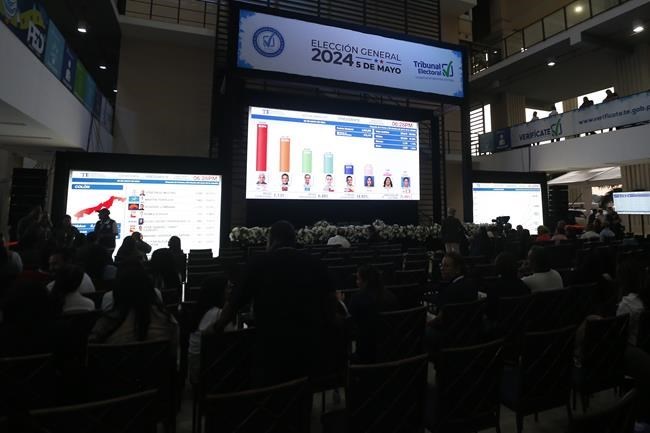PANAMA CITY (AP) — José Raúl Mulino, the stand-in for disqualified ex-President Ricardo Martinelli in Panama's presidential election, took the lead in early returns Sunday night, holding 34% of the votes and a nearly 10-point lead over his four competitors.
Though only 60% of the votes had been counted, supporters in Mulino's campaign headquarters erupted in celebration, singing and waving flags. Panama doesn't have a runoff system, so the candidate with the biggest share of votes wins.
Eager for change after months of political turmoil and protests, Panamanians weighed promises of economic prosperity and migratory crackdowns against a corruption scandal. The election was consumed by unfolding drama surrounding the country’s former president, even though he was not on the ballot.
“Panama’s election will be one of the most complex in its modern history. The vote is marked by increased political fragmentation and social discontent under outgoing President Laurentino Cortizo,” said Arantza Alonso, senior analyst for the Americas at the risk consulting firm Verisk Maplecroft, before the polls opened.
The presidential race had been in uncertain waters until Friday morning, when Panama’s Supreme Court ruled that Mulino was permitted to run. It said he was eligible despite allegations that his candidacy wasn’t legitimate because he wasn’t elected in a primary.
Mulino joined the race late, replacing former President Ricardo Martinelli as the candidate for the Achieving Goals party. The fiery Martinelli was barred from running in March after he was sentenced to more than 10 years in prison for money laundering.
Martinelli, a business tycoon who was president of Panama from 2009 to 2014, dominated much of the race. He campaigned for his former running mate from inside the walls of the Nicaraguan Embassy, where he took refuge in February after receiving political asylum. On Sunday morning, Mulino strolled into the Nicaraguan Embassy trailed by photographers and wrapped Martinelli in a big hug, saying, “Brother, we’re going to win!”
While lacking Martinelli’s spunk, Mulino coasted on his connection to the ex-president. He is rarely seen without his blue “Martinelli Mulino 2024” cap and promised to help Martinelli if elected, a pledge welcomed by the ex-president’s supporters.
Panamanians are largely fatigued by the endemic graft that plagues the country. Nonetheless, many are willing to overlook Martinelli’s prison sentence, a 2017 arrest in Florida and other corruption scandals in favor of the humming economy seen during his presidency.
Among them was Juan José Tinoco, voting from his working-class area of small, concrete houses surrounded by extravagant skyscrapers. The 63-year-old bus driver said he planned to vote for Mulino because it was the closest thing he could get to Martinelli, adding that he had earned a decent amount of money during the former president’s time in power.
“We have problems with health services, education, we have garbage in the streets ... and corruption that never goes away,” Tinoco said. “We have money here. This is a country that has lots of wealth, but we need a leader who dedicates himself to the needs of Panama.”
Mulino promised to usher in another wave of economic prosperity, and stop migration through the Darien Gap, the perilous jungle region overlapping Colombia and Panama that was traversed by half a million migrants last year.
While Mulino’s message resonated with many voters, others like 68-year-old Uber driver Emanuel Romero agreed the country needed change but with someone new at the helm.
Romero’s car was painted with banners of Ricardo Lombana, a candidate who has decried corruption and sought to earn the vote of young Panamanians eager for change.
Mulino led polls with around 35% of the vote, while his competitors lagged behind. Former President Martín Torrijos trailed in second at 15%, while former presidential candidates Rómulo Roux and Lombana scooped up 14% and 12% respectively, according to a March poll by the Panamanian Institute of Civic Studies.
“If we want to see more of the same — corruption and our country falling apart — let’s vote for the same people. I will vote for someone independent, and I trust he’ll do things in a better way that will save the country,” Romero said.
No matter who takes the reins, Panama's next president faces an uphill battle, on the economy especially. Last year, the Central American nation was roiled for weeks by mass anti-government protests, which came to encapsulate deeper discontent among citizens.
The protests targeted a government contract with a copper mine, which critics said endangered the environment and water at a time when drought has gotten so bad that it has effectively handicapped trade transit through the Panama Canal.
While many celebrated in November when the country’s Supreme Court declared the contract unconstitutional, the mine closure, the recent slowdown of economic growth and slashed Canal transit will put Panama's new leader in a tight spot.
——
Associated Press journalist Janetsky reported from Mexico City.
Juan Zamorano And Megan Janetsky, The Associated Press



